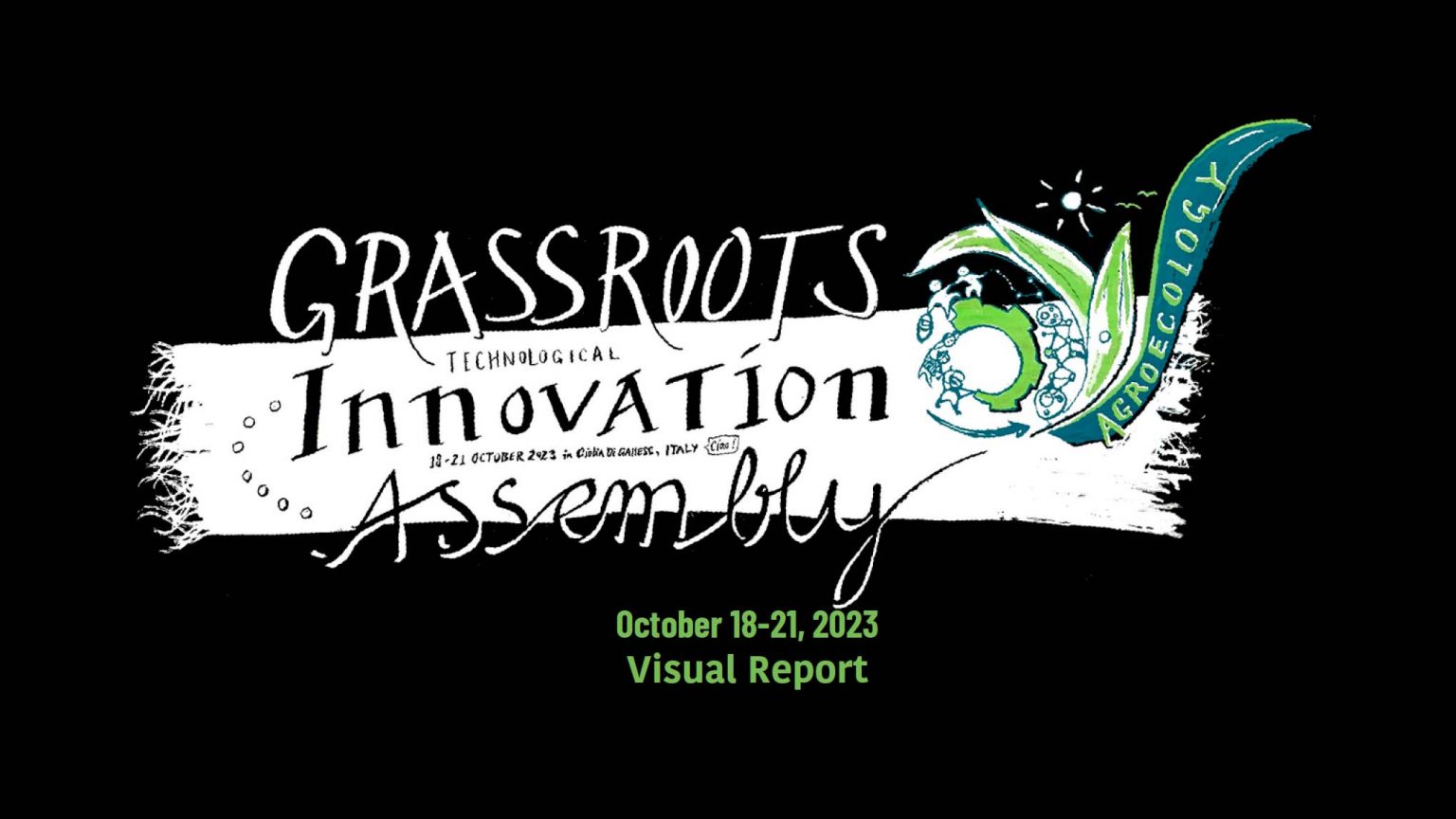 12 - 13 June 2024. - Grassroots Innovations Assembly for Agroecology (GIA). Drawing from a foundation of food sovereignty, agroecology and the Rights of people to define their food systems, GIA has been created (2023) to defend technological autonomy as a powerful tool to strengthen small-scale food producers globally and improve resilience, autonomy and sovereignty
12 - 13 June 2024. - Grassroots Innovations Assembly for Agroecology (GIA). Drawing from a foundation of food sovereignty, agroecology and the Rights of people to define their food systems, GIA has been created (2023) to defend technological autonomy as a powerful tool to strengthen small-scale food producers globally and improve resilience, autonomy and sovereignty
GIA is a space of sharing where grassroots innovations networks around the world -who are already demonstrating an farmer-led future for agricultural technology – can connect and build a grassroots perspective on innovations.
June 12th
- Introduction by Schola Campesina (Italy), Caroline Ledant
- Presentation of the report by VIVES (Belgium), Geert Furniere
- Christina presented Tzoumakers (Greece) and highlighted the need for organization and network to support smallholders to get adequate technologies.
- Then from the audience Soledad from ETC group (Argentina) -active on grassroots assessment on technologies- congratulated GIA for the reflections conducted in the frame of the Assembly
- Monica from Los LLanos (Argentina) expressed a lot of interest
- Nelson from ProRural (Bolivia) explained their activity around building tools at local level
- Annor (Ghana) highlighted different questions to be explored as the role of local authorities and local leaders.
- Way forward ? Make GIA known as a place for a broader reflection on local solutions in the face of the wave of high-tech
- Any suggestion or remark can be sent at caroline.ledant@scholacampesina.org (temporary host of GIA
June 13th
- Introduction by Schola Campesina (Italy), Caroline Ledant
- Presentation of the report by VIVES (Belgium), Geert Furniere
- Jenni Ottilie (visual scribe) shared on the poster process and her efforts to visually capture the dynamics of the group in the Gallese meeting
- Prolinnova member, Joseph Righa (Kenya) emphasized GIA as a place of sharing, opening avenues for collaboration and support to smallholders daily innovations, to improve their livelihoods, through farmer-led (joint) experiments and Participatory innovations development. He explained that GIA is still under the process of developing a Charter and common rules of functioning ; the potential is huge.
- Honey Bee / GIAN member Anamika Dey (India) connected GIA to organizations in Asia: the principles to innovate for solving real people problems, guided by Food Sovereignty vision is shared by other organizations / Sharmila from Malaysia and Philippine organization.
Sharmila: Yayasan Inovasi Malaysia (YIM) is the leading social innovation agency, established in 2008 under the Ministry of Science, Technology and Innovation (MOSTI). They set up a network of maker space in Malaysia. They support 7.000 innovators (researchers, academia, farmers, …) and help them to close the gap with commercialization (innovations are gathered in a non public platform). They have a mechanism to finance innovations and bring them to a better tech readiness. They look to collaborate with Honey Bee / GIAN in India and other neighbouring countries and possibly merge their database of innovations (but IP problem). They have specific programme for marginalized group. They are developing the maker spaces (with digital studio, 3D printers ; etc… accessible to the population)
Farida Mahri Wangsakerta Foundation (Indonesia). Work with youth and women, on solutions for farming but also food processing,… e.g. Food dryers for herbs, drying process to sell it (for human and animal use) ; bio fertilizer from local plants, skill people, increase awareness on the plants naturally present in the communities, and disseminate this knowledge. Work on the autonomy of people, on auto solutions to solve our problems.
Resource:
GIA (2024) The Grassroot Innovation Assembly Visual Report, 2023. # 25 pp
- This report documents the first international gathering of the Grassroots Innovations Assembly from Oct 18-21 in Gallese, Italy. As food producers confront climate crises, corporate capture, and the new extractive technologies of AG 4.0, smallholders are organizing their own innovation networks for agroecological methods. The work of these networks demonstrates that peasant autonomy is possible through grassroots innovation, knowledge-sharing, research, and collaboration.
- Drawing from a foundation of food sovereignty, agroecology and the Rights of people to define their food systems, GIA has been created (2023) to defend technological autonomy as a powerful tool to strengthen small-scale food producers globally and improve resilience, autonomy and sovereignty
- The idea for an international grassroots innovations assembly was seeded in 2018 when the organizers of the gathering, a group of established innovation networks like Farm Hack, L’Atelier Paysan, and Schola Campesina, first crossed paths at the UN Food and Agriculture Association (FAO) summit on innovation.
- You will find the link to the report here.
communicate on Agroecology. Here is an aggregated list:
- Innovation catalogs and magazines sharing alternative solutions
- Video documentation, including everyday techniques because what seems normal to one farmer may be an innovation to another
- Knowledge-sharing databases and wikis - for instance the Grassroots Innovation Database [GRID] - created by UNDP India : contributions from Anamika Dey, Visiting Faculty at Indian - Institute of Management Ahmedabad
- Parties, big social gatherings, and festivals. Having fun together!
- Agroecology schools and summer school for farmers as an alternative to the corporate-controlled university extension system
- Finding a volunteer farmer for each local area who provides general support to answer neighboring farmers' questions
- In-person building workshops where everyone goes home with their own tool
- Hackathons and collabathons
- Mobile workshops and on-farm tool repair
- Makerspaces and shared workshops
- Trips to scout existing grassroots innovations
- Hub farms that help organize feedback on innovations
- Innovations fairs - social forum for innovators, opportunity to document innovations, opportunity for officials to recognize smallholders’ innovations, which helps push for policy change.



No comments:
Post a Comment